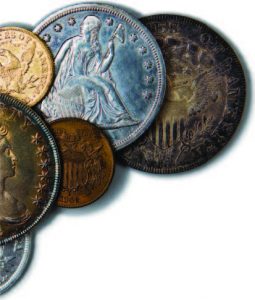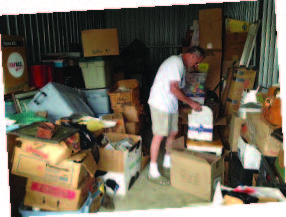What you don’t see on TV can hurt you.
By Chris Myer
I would love to tell you there is a science to buying storage units. But I would be lying. I would love to tell you that it is easy money. The truth is it’s hard work. I have been buying at storage auctions for the past 12 years and averaging three a week. The storage biz colorfully augments the more predictable means of buying merchandise (estates, regular auctions, and house calls) for my retail store. For every ten units I see I might be tempted to bid on one. Sometimes I win it and sometimes I don’t. Sometimes I walk away with treasure. Sometimes I haul away trash. On most days it’s a combination of both.
Most lockers look bad when the lock comes off and the door goes up. However, every once in a while I see a unit with some antiques or at least a little character. When you see a unit on TV being viewed, you can’t really judge it. You can only “read it”—to the extent you can read it—in person.
The fact is that anything is liable to come out of a storage locker. Basically, though, what you find is boring “Made in China” junk. Despite what you see on the TV shows, there’s not much glamour to this business…and plenty of pitfalls. Abandoned storage units, or rather their contents, are a reflection of our consumer-driven society. When you have seen what I have seen, you realize we are binging on trash: cheap furniture, cheap decorations, cheap household goods, cheap everything. If people could comprehend the sheer volume of poorly made, mostly imported junk, they would be appalled.
My wife, Rose, and I own an antique center that also sells used items that are valuable or interesting (some not necessarily antique). My primary focus at auctions is the unit that may have older items, or things of good quality. When I see clues that tell me a room may have collectibles or other items of interest, I’ll get in on the bidding. However, there are no guarantees. Often a room that looks promising just doesn’t pan out. Over time, you do develop a feel and a set of rules that give you a slight edge.
 THE BIG SCORE
THE BIG SCORE
I’ve had some great finds, of course. The best was probably three units that belonged to a New York City ephemera dealer. I went in with a partner (sales are cash-only so it is not usual for bidders to join forces to buy an expensive unit). We could see it looked interesting, but couldn’t see beyond the plastic tubs and boxes. Well, it turned out to be a treasure trove. We sold just the postcard collection immediately and made three times our cost. It turns out this person was a very advanced collector and dealer. He had great stuff. The thing you want to find—and what shows up with some regularity—is a locker containing jewelry or coins. And, of course, cash is always good. I’ve only found a couple of hundred dollars in a locker, but I know instances where several thousand have been discovered in storage.
 Back in July, I bought a small, scruffy room that didn’t look like much, but I saw an oriental rug so I bid on it and won. In the back there were some boxes of collectibles—coins, a little jewelry, military items, fountain pens. Back in my office, I was looking through these boxes and there was an odd-looking pen. I played with it a bit to get it open and when I clicked the cap it went BANG. It was a pen gun, like something out of a James Bond movie! Luckily, there was no projectile, but I got a powder burn on my finger. I’m lucky I wasn’t pointing it at my face.
Back in July, I bought a small, scruffy room that didn’t look like much, but I saw an oriental rug so I bid on it and won. In the back there were some boxes of collectibles—coins, a little jewelry, military items, fountain pens. Back in my office, I was looking through these boxes and there was an odd-looking pen. I played with it a bit to get it open and when I clicked the cap it went BANG. It was a pen gun, like something out of a James Bond movie! Luckily, there was no projectile, but I got a powder burn on my finger. I’m lucky I wasn’t pointing it at my face.
There is actually a lot of danger in storage units. You get more cuts, abrasions and things falling on you than you can imagine. There can be something really heavy stacked high that can drop on your head. Hazardous materials can turn up, too, and you need to know how to properly deal with them.
GETTING PERSONAL
As a buyer of storage units, I try to look past the fact that this is someone’s life packed into a 10-by-10 space. It’s not easy. Many times, we’ll see a person pay his bill just before the auction begins. And yes, people who owe a lot of money on a room sometimes show up and try to buy it for less than they owe. Most facilities won’t allow them on the premises, but there isn’t anything to stop them from sending in a proxy to do their bidding. I like to steer clear of units where I sense that the owner still wants it or needs something out of it. I much prefer to bid on rooms that have clearly been abandoned. And anything that looks like an item of personal value or significance, I will box up and leave with the manager.
By the way, the personal stuff can be extremely personal. It’s a voyeur’s dream. Each unit truly is a person’s life. There are typically boxes of bills and papers, diplomas, photos, very often wills, gift cards. I can’t count the number of photo albums that were meticulously assembled and cared for, only to be abandoned. I also can’t count the numbers of strange and alarming things I’ve uncovered. Name America’s weirdest fetishes and insecurities and you’ll find them in storage units. This is not a business for people with weak stomachs, but it is fascinating. What do I find in almost every unit I buy? Self-improvement books. Religious items. And pornography. And way more often than you’d guess, I find all three!
COLD SWEAT
Is there a locker I got so badly burned on that I still wake up in a cold sweat thinking about it? Yes, but it’s not the money that makes a locker a bust, it’s the work. If you make a mistake and blow a thousand bucks on a small room, you’ll make some of that money back and then move on. But if you blow that thousand on a big, bulky room where it takes a week of moving and packing and multiple trips to the dump, it’s a truly miserable task. That’s actually what drives most people out of this business.  They don’t realize the logistics can be very difficult. And no matter how much stuff you think is in a room, there’s always a lot more once you start going through it. Much more. It’s as if it grows.
They don’t realize the logistics can be very difficult. And no matter how much stuff you think is in a room, there’s always a lot more once you start going through it. Much more. It’s as if it grows.
BUYERS BEWARE
Who shows up at storage auctions? Most of the people who buy lockers for a living are doing flea markets. Darrell on Storage Wars is a good example. He does the big outdoor swap meets in California. Others, like Jarrod and Brandi, are buying for thrift shops. A lot of people at auctions, you get the sense they’re just goofing around, like Barry and those two twins on Storage Wars. I actually prefer New York Storage Wars because it’s a little more realistic. I’ve been on that show—I was relegated to an under-bidder’s role. They pick out the lockers they want to film, they shoot the bidding as it happens, and then they “re-shoot” it so they can do cutaway shots of different bidders.
Needless to say, the storage-auction TV shows have spawned a whole group of newbies who turn up at sales and throw money around. Most come and go. They try it for a while and are driven out by the more hardcore buyers who better understand the complexities of the business. What newcomers discover very quickly is that there are no shortcuts. Plus, many only have a couple thousand bucks to play with—if they buy a unit where they can’t get the money back quickly, they’re essentially out of business.
People watch these shows and think, Maybe I’ll buy a few lockers, see what I get and then decide if this is a business I want to be in. That would be very tough. You’re going to end up with tons of clothing and household items, pots and pans and such, so the likelihood is that the business you’d start would be a flea market business. Is that a business you want to jump into because you saw a show on television? When I get these things in a locker, I channel them to the flea market dealers. In return, maybe down the road they’ll help me clean out a tough room. Not to disparage the flea market guys. You can grind out some decent money setting up at flea markets if you are really committed. But that’s not my thing.
If you do decide to get into the storage locker business, I think I can offer some guidelines without divulging any deep, dark secrets. Stay away from rooms with a lot of plastic toys and tubs with Christmas and Halloween decorations. As particular as I try to be, I’m not infallible. I still end up with gobs of this stuff. For obvious reasons, you should look for sales in wealthier areas. However, you don’t want to travel too far, because if you have to make multiple trips to move the items, your profit disappears with the time and money that you waste.
I try to get a vibration from what I can see in a locker. I look for clues that actually help me picture the person who rented it, and that in turn helps me guess at what’s hidden inside. All of this should be common sense. If you’re looking for an edge, it’s going to come from limiting your mistakes and understanding how to sell what you buy—not any brilliant secret strategy.
The distinct edge that I have is that I’ve developed a network of people that enables me to move merchandise that is not appropriate for the antique center. So if something specific is exposed when the door goes up on a unit, I will recognize its value and know how to turn it over. Another edge I have is that I am known as the guy who buys antiques and collectible items. So if a flea market dealer buys a unit and finds high-end merchandise, he will often call me and I end up buying it from him. So, in a sense, I am able to “cover” a lot of sales without having to physically be there. Also, I should mention that, because I buy a good deal of merchandise from these storage auctions, we are able to pass on some pretty amazing savings to our customers at the store, not just on antiques and collectibles, but also quality dressers, coffee tables, garden urns, stemware, china, and so on.
The people who make the best use of storage lockers are those who run businesses out of them. Contractors, electricians, trades-people—they actually make those units pay. The people who should not be using storage units are the ones who put all of their family items in there and then pack them so tight that they can never actually get at them without unpacking everything. They become stymied. They have to keep paying on a unit that is essentially useless. Again and again, I see units where people have been using the first foot or two, and never touched 95 percent of their stuff because they could no longer get in there.
I honestly believe that most people who store stuff shouldn’t be storing it. They should get rid of it one way or another. Donate it. Repurpose it. Throw it away. Otherwise they will pay many times what the contents are worth and derive no benefit. A lot of units with a value of a few hundred dollars have been there for five or six years, meaning the owners have paid thousands and thousands of dollars. Finally, they just gave up.
 Editor’s Note: Chris Myer and his wife, Rose, own and operate the Shore Antique Center in Allenhurst with help from their son, Stephen James.
Editor’s Note: Chris Myer and his wife, Rose, own and operate the Shore Antique Center in Allenhurst with help from their son, Stephen James.





